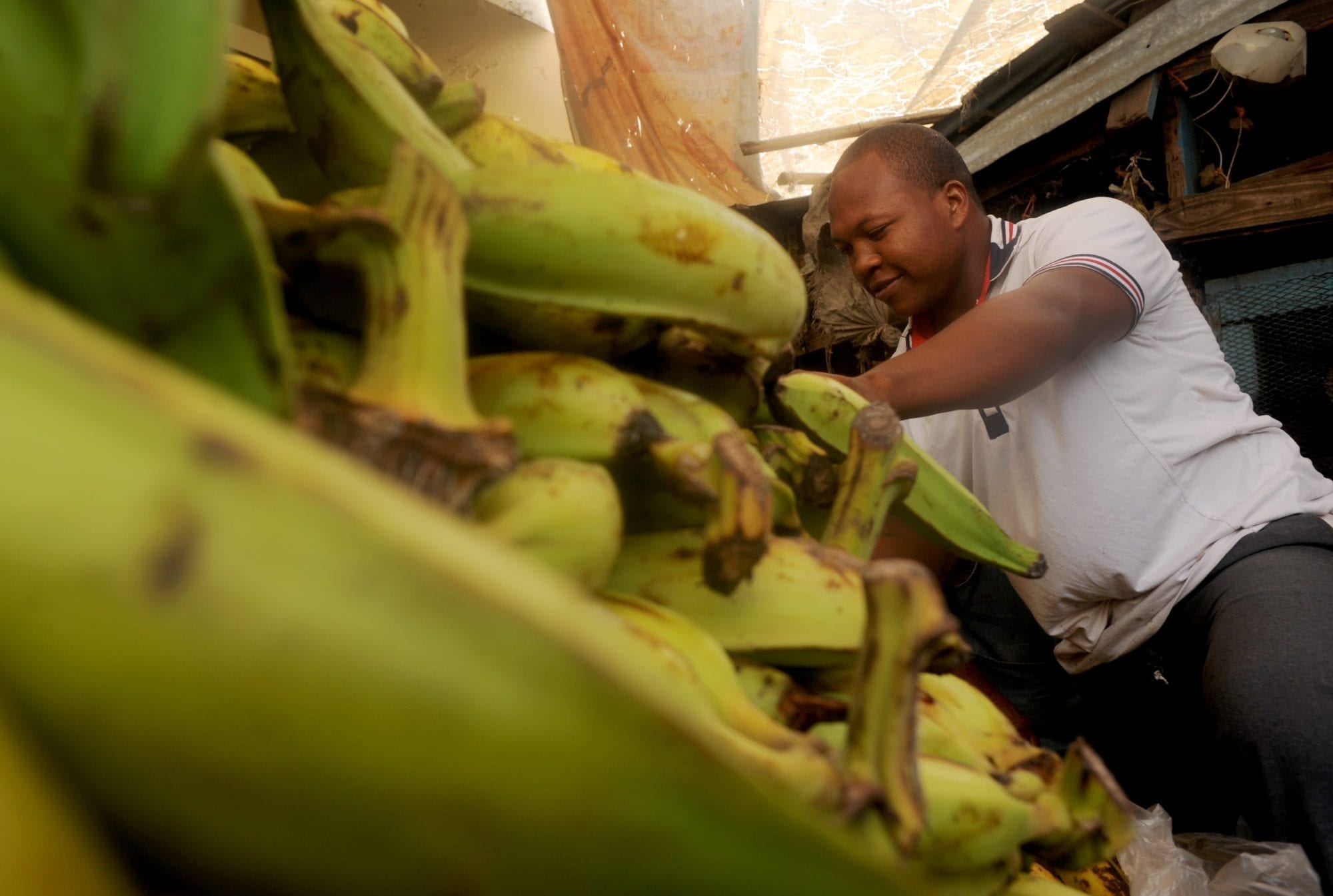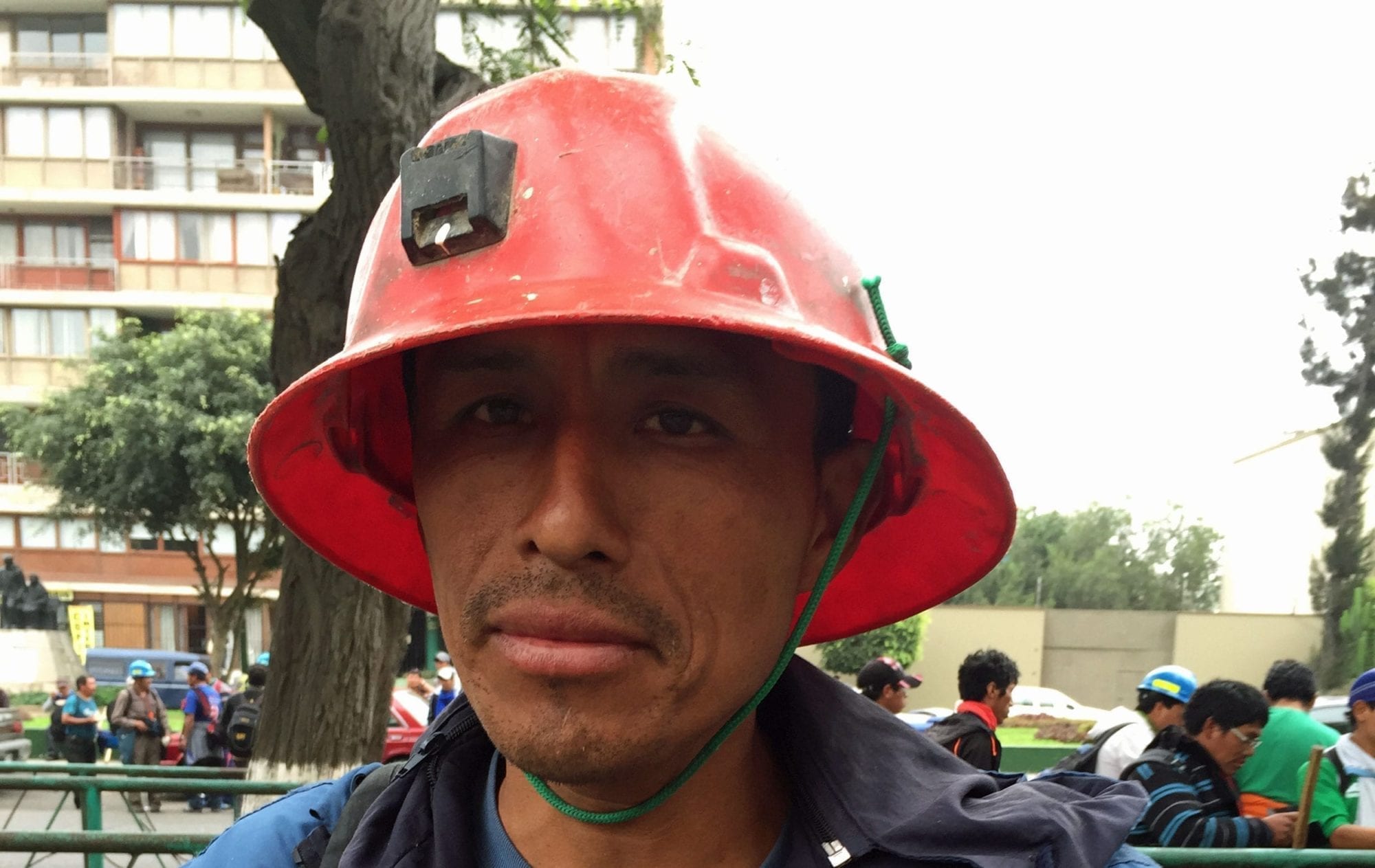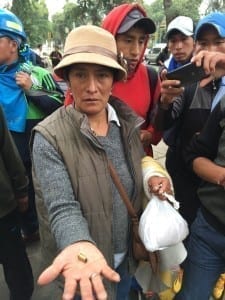
Jun 19, 2015

Solange Ambroise sells vegetables in the San Cristobal Municipal Market. Credit: Solidarity Center/Ricardo Rojas
Rarely do governments admit failing their citizens. However, on Friday the 193-member states of the United Nations did just that when they voted to rectify their failure to uphold the rights of workers and to ensure decent working conditions for more than half of the world’s working women and men.
By voting for an International Labor Organization (ILO) recommendation, The Transition from the Informal to the Formal Economy, the large majority of the world’s governments has done more than just pledge to provide the basics for the world most vulnerable workers—those struggling to make ends meet in the informal economy—they have begun the essential process of strengthening society by promoting worker rights.
Street vendors, home-based workers, domestic workers and day-laborers usually work “off the grid” and outside a country’s regulations and labor laws. They join subcontracted, temporary and part-time workers who subsist on the fringes of the formal economy. These jobs typically pay low wages, perpetuate worker and human rights violations, provide limited or no social benefits, and offer little access to union representation. For most of these workers, survival trumps active engagement in society’s daily undertakings.
An estimated 1.5 billion, or approximately 60 percent of the world’s workers, toil in the informal economy, according to the ILO. In some developing countries, informal jobs comprise up to 90 percent of available work, and most workers take these unstable jobs out of necessity, not by choice.
Women, migrant workers and the young are disproportionately represented in the informal economy, and often the most exploited. Their situation is exacerbated because they may be barred from joining unions, which could offer support through collective bargaining on wages and working conditions, or because unions have not been able to reach them due to the isolated and changeable nature of their job.
Informalization of work fuels global income inequality, poverty and abuse. For example, at age 22, N. Naga Durga Bhavani left her small village in India for Bahrain, where she hoped a job as a domestic worker would help pay for her young daughter’s heart surgery. But when she arrived, after paying labor recruiters the equivalent of nearly two months’ wages, she says her passport and papers were confiscated, and she was forced to work long hours, trapped in an abusive environment where she was beaten, her fingers broken. After she escaped, the Indian Embassy could not help her leave the country because she had no identification.
And the drag on society does not end with the desperate plight of workers like Bhavani. Businesses employing workers in standard employer-employee relationships find themselves at a distinct disadvantage when they compete against those chasing short-term profits by not hiring full-time workers, paying taxes and benefits, or complying with regulations and labor law. Companies that provide financial and business services miss huge swaths of potential clients whose income leaves them too poor to enter the shop door and unable to access credit.
The effects on government are even more profound. The loss of tax revenue on huge percentages of GDP in many countries is only one edge of the sword. Because workers in the informal economy usually hang from the bottom rung of the economic ladder, they are more likely to need social safety nets—the very nets their jobs do not support through tax revenue.
Friday’s vote is significant because governments, worker representatives and employer representatives, who usually operate with very different agendas, publicly acknowledged the imperative of providing all workers with rights at work, social benefits and the ability to join a union. Their acknowledgement that the current system does not work—not for working people, not for governments and not for the businesses that serve them—is an important step toward bringing millions of workers into decent jobs that comply with labor codes and allow workers to be stronger members of their society. All of us should applaud the 193 nations for not choosing failure.

May 21, 2015

Bullet shells shot into a crowd of mineworkers at Peru’s Labor of Ministry.Credit:Solidarity Center/Samantha Tate
Six mineworkers were arrested and one injured from police gunfire yesterday as some 100 workers protested at the Ministry of Labor and Employment Promotion in Lima, Peru. The miners, who have been on strike for 17 days at Buenaventura’s Uchucchacua silver mine in the coastal region north of Lima, are calling for immediate improvement in safety and health conditions in the mines, especially air quality, which they say is extremely hazardous.
The mineworkers, all contract workers, gathered at the Labor Ministry, hoping their representatives could speak with Ministry representatives. After police accused them of blocking a public sidewalk, a police officer shot at the group, wounding mineworker Roberto Loyola, in the leg.
“We reject how we have been received here at the Ministry of Labor, with a worker wounded by a bullet,” says Uchucchacua Workers Secretary General Ronald Ventocilla. “We cannot allow Peruvians to be shooting at Peruvians. Buenaventura is an irresponsible employer that ignores its obligations to its workers, including high levels of carbon monoxide in the mines and not providing mineworkers with the food that they have committed to provide.”
On Tuesday, the Mineworkers Federation (FNTMMSP) launched a nationwide strike in part to call for a repeal of additions to Peru’s Health and Safety Law that make it more difficult for injured workers or their families to hold employers accountable for workplace injuries. Employers requested the amendments to the law, which was enacted last July.
Miners told Solidarity Center staff in Lima yesterday that when safety and health inspectors arrive at the mine to investigate working conditions, managers turn off the older machinery that produces the worst air contamination. Mineworkers regularly work 10-hour days underground for 14 days, followed by seven days off, and they say the continued exposure to toxic gasses prematurely ages them.
Contract workers at the mine, who are not in a union, earn $16 day, less than unionized Uchucchacua mineworkers, who are paid $22 a day, of which almost one third must be returned to the employer for food. Up to 30 workers who have participated in the strike have received letters from the employer saying they will be laid off for participating in the strike.
Buenaventura Group, owner of the Uchucchacua mine, is Peru’s largest producer of precious metals and in May announced $17.3 million dollars in net profit for the first quarter of 2015. The Uchucchacua mine, in the province of Oyon Lima region, produces about 714,300 pounds of silver a year. Peru is the world’s third-biggest silver producer.
Vowing to stay in Lima until Labor Ministry receives them—striking workers are sleeping under the eaves of the National Stadium because they don’t have the money to pay for a hotel—Ventocilla says, “Three days ago we started a ‘march of sacrifice’ to Lima and we are going to continue until the Ministry receives us.”
FNTMMSP decried the use of police violence to repress workers freedom of speech and is working with National Human Rights Coordinating Body to seek the release of the detained workers.
Nov 4, 2013
November 4, 2013—Indonesian workers are planning a second round of nationwide protests for better wages, likely beginning November 6, according to the Jakarta Labor Forum.
After 3 million workers last week went on a two-day strike across the country, the government raised the minimum wage by between 10 percent and 11 percent, well short of the amount workers are seeking in an economy where inflation is expected to rise by 9 percent next year. Indonesian workers are calling for higher wages to match those of other Asian countries as foreign direct investment flows into the region’s biggest economy. Workers also want an end to job outsourcing.
In an editorial supporting the workers, the Jakarta Post wrote that “workers live in virtual poverty even while the minimum wage is described as a ‘decent standard of living.’”
The editorial quoted Jumisih, a union leader from North Jakarta’s industrial area, who said: “Renting a small space … with several others, with no ventilation in a squalid area is not decent.”
At least 17 workers were attacked during last week’s rallies, according to the Confederation of Indonesian Worker’s Union (KSPI). The union said the workers were hospitalized after receiving wounds from sharp weapons and four are in critical condition. KSPI is calling for an end to such attacks.
Indrasari Tjandraningsih, a labor researcher at AKATIGA, the Center for Social Analysis, maintains that workers’ demands to ban outsourcing are also supported by data on the widespread exploitative and degrading practices.
In an opinion piece in today’s Jakarta Post, he writes: “When workers demand social security they refer to both the Constitution and the law on social security. All these show that workers’ demands are not irrational but have solid grounding. This state of affairs should be understood in a more positive context: Indonesian workers are getting more aware of their rights and also have more capability to see problems in a comprehensive and objective manner.”
Oct 24, 2013
Today marks the six-month anniversary of the Rana Plaza building collapse in Bangladesh, which killed more than 1,200 garment workers, primarily women, and injured 2,500 more.
In the wake of this catastrophe, several steps have been taken to address workplace safety at the country’s thousands of garment factories: Some 100 major corporations have signed on to the Bangladesh Accord on Building and Fire Safety, a binding agreement that commits brands and the companies they source from to addressing building and fire hazards and ensuring unions are a key part of this process; and the Bangladesh government has moved toward allowing registration of unions at garment factories.
But on the factory floor, garment workers are reporting a torrent of employer resistance when they seek to form a union to ensure they have a collective voice to fight for workplace rights like job safety and health. Workers who spoke recently with Solidarity Center staff in Gazipur, Bangladesh, described the difficulties they face when seeking a union, even though forming a union would allow them to address deadly working conditions, such as those that led to the Rana Plaza disaster, where a multistory building pancaked in on workers.
Workers are the best monitors of conditions in their factories because they are on the shop floor every day, and many of those at Rana Plaza factories have told the Solidarity Center that they were threatened with the loss of their meager wages if they did not go back to their machines. If they had had a union, they could have had the strength to resist being forced into a death trap.
Workers also told Solidarity Center staff that at the center of what they want from their employers boils down to this: “respectful treatment.”
They know that with respect, all the rest—clean drinking water, sufficient wages to support their families, unlocked fire escapes—will follow.
May 28, 2013
Recognizing that “the challenges confronting the working men and women in Pakistan cannot be effectively” addressed without a strong and united workers’ voice, the Pakistan Workers Federation and eight other union federations are seeking to unify their organizations.
Leaders from the federations, which include the Muttahida Labor Federation (MLF) and the All Pakistan Trade Union Congress (APTUC), met this month in Islamabad, Pakistan’s capital, to discuss unification. They unanimously passed the resolution “Towards Unity of Labor Movement in Pakistan” and pledged to strengthen unity and work collectively by bringing workers from all industries together in a common platform.
The executive boards of each federation must approve the resolution. M. Zahoor Awan, general secretary of the Pakistan Workers Federation, was appointed to act as the coordinator for the unity process.
Read the full resolution.




